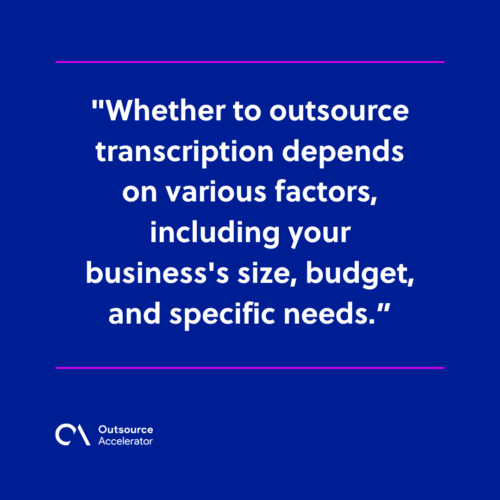Why call transcription is important for your business

Audio and video recordings are most useful nowadays for sifting through meeting points you might have missed earlier. This comes with the abundance of remote meetings and voice conversations done online.
However, with volumes of recording at hand, pulling out information may be more difficult when you don’t have a visual guide.
Call transcription can be a game-changer in this part. Through this setup, you can review conversations better and repurpose your transcripts into useful content for your site.
There are other benefits your business can get from call transcription. This article will explore what call transcription is and its importance to your business.
What is a call transcription?
Call transcription is the process of converting spoken words from phone conversations into written text.
Sophisticated algorithms analyze audio recordings and transcribe them accurately into written form. This allows businesses to have a textual record of their phone conversations for storage, reference, and repurposing.

Benefits of call transcription
Call transcription offers numerous benefits to businesses, such as the following:
Improving customer satisfaction
Understanding the customer’s voice helps firms tailor their products and services accordingly. It also enables them to address customer concerns more effectively and create personalized experiences.
Businesses can gain valuable insights into customer needs, preferences, and pain points by transcribing phone conversations.
Enhancing communication
Transcribing phone calls can foster better communication and collaboration within a business.
Call transcription provides a permanent record of discussions, decisions, and action items. This eliminates manual note-taking, ensuring that important information is accurately captured.
Everyone can refer to the transcriptions for clarity, reducing miscommunication and improving productivity.
Facilitating legal compliances
In certain industries, call transcription is essential for compliance and legal reasons.
Organizations operating in sectors such as finance, healthcare, and legal services often handle sensitive information during phone conversations. Healthcare and legal transcription services are even delegated to external providers for a firm’s added convenience.
Having a written transcript of these conversations helps meet regulatory requirements and serves as concrete evidence if disputes arise.
How to transcribe calls
Transcribing calls requires a systematic approach and suitable tools and techniques. Here are some steps to consider when transcribing your phone conversations:
Step 1: Choose the right transcription software
Invest in reliable transcription equipment and software with high accuracy and features tailored to your business needs. Look for software that provides:
- Automated transcription capabilities
- Speaker identification
- Timestamps
- Editing options
These features will save you time and effort during the transcription process.

Step 2: Prepare and organize audio recordings
Before transcription, make sure your audio recordings are clear and of good quality. Remove any background noise or interruptions that might hamper the accuracy of the transcription.
Organize your recordings by date, topic, or customer to easily locate and access the relevant conversations when needed.
Step 3: Utilize transcription tools and features
Take advantage of the features provided by your transcription software. Use timestamps to navigate through the transcript and quickly locate specific sections of interest.
Speaker identification helps distinguish between participants in the conversation for accuracy and clarity in the transcript.
Ensure that your transcription tool integrates seamlessly with your existing communication platforms for a streamlined workflow.
Step 4: Edit and review for accuracy
While automated transcription can be highly accurate, make it a habit to review and edit the transcriptions for any errors or inaccuracies.
Proofread the transcript, correct any misspellings or misinterpretations, and ensure the context is properly captured. Editing the transcript helps maintain its quality and ensures that the information extracted is reliable and useful.
Should you outsource call transcription?
Call transcription is a valuable tool that brings numerous benefits to businesses. From improving customer service to facilitating compliance, transcribing calls can significantly impact overall business performance.
Whether to outsource transcription depends on various factors, including your business’s size, budget, and specific needs.

Here are a few factors to consider when delegating call transcription to service providers:
Cost-effectiveness
Outsourcing call transcription can be cost-effective, especially for smaller businesses with limited resources.
Through outsourcing, clients can avoid investing in expensive transcription software or hiring dedicated in-house transcription staff.
Expertise and quality
Professional transcription service providers have extensive experience and specialized skills in accurately transcribing audio recordings. They are well-versed in transcription best practices and ensure high accuracy and quality in their work.
Outsourcing call transcription ensures you receive reliable and error-free transcripts.
Time efficiency
Transcribing calls can be a time-consuming process.
Outsourcing this task allows your internal teams to focus on core business activities instead of spending valuable time transcribing conversations. It helps enhance productivity and enables employees to allocate their time and efforts more efficiently.
Data privacy and security
When outsourcing call transcription, ensure the service provider adheres to strict data privacy and security protocols.
Confirm they have robust measures to protect sensitive information and comply with relevant regulations such as GDPR or HIPAA.







 Independent
Independent




